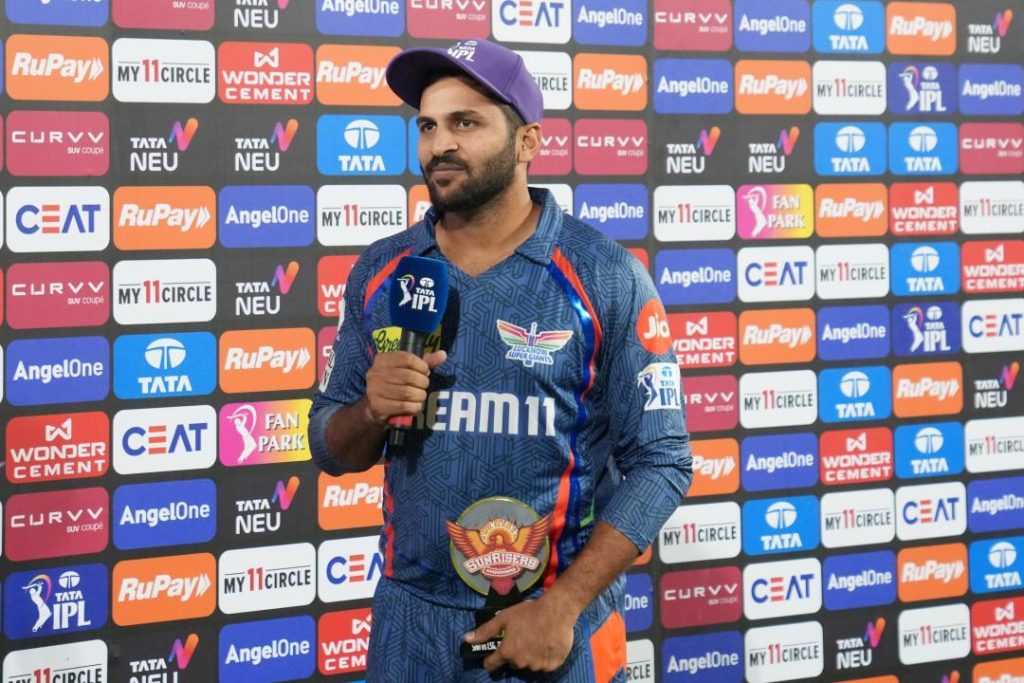
Shardul Wants Justice for Bowlers After Stopping SRH’s Batters
The Indian Premier League (IPL) 2025 has seen its fair share of thrilling matches, and the recent encounter between Sunrisers Hyderabad (SRH) and Lucknow Super Giants (LSG) was no exception. Shardul Thakur, the LSG pacer, played a crucial role in his team’s victory, claiming four wickets and helping to restrict SRH to a manageable total. However, despite his impressive performance, Thakur wasn’t pleased with the surface he was bowling on.
In a post-match interview, Thakur expressed his concerns about the pitch, stating that it was unfair to bowlers for teams to score big runs. “Pitches should be prepared in a way that gives the game balance,” he said. “With the impact sub-rule coming in, it’s unfair on bowlers if a team scores 240-250 runs.”
Thakur’s comments are likely to spark a debate about the state of pitches in the IPL. His team, LSG, won the match by a comfortable margin, but Thakur’s performance was all the more impressive given the conditions he had to bowl on. SRH’s openers, in particular, got off to a flying start, with Abhishek Sharma and Mayank Agarwal putting on 80 runs in the first 10 overs.
However, Thakur’s introduction into the attack changed the complexion of the game. He bowled with accuracy and pace, and his wickets of Agarwal and Sharma proved crucial in restricting SRH’s scoring rate. His final figures of 4/43 in 4 overs were all the more impressive considering the quality of batsmen he was up against.
Thakur’s frustration with the pitch is understandable. In an era where teams are looking to score big and take the game away from their opponents, the role of bowlers has become increasingly challenging. The impact sub-rule, which was introduced to counter the trend of teams scoring big, has only added to the difficulty.
Under the impact sub-rule, teams are required to bowl a minimum of 20 overs in a match to be eligible for a bonus point. This has led to teams opting for slower bowlers and spinners, who can bowl more overs without compromising their economy rates. Thakur’s comments suggest that he believes this rule has gone too far, and that bowlers are being unfairly penalized for not being able to contain big-scoring teams.
LSG’s victory was a testament to the importance of bowling well in the IPL. Despite SRH’s aggressive start, Thakur’s wickets and the subsequent collapse of the SRH batting order meant that LSG were able to restrict their opponents to a manageable total. The LSG batsmen, led by captain KL Rahul, then took care of the rest, chasing down the target with ease.
Thakur’s performance was all the more impressive given the fact that he was bowling on a surface that was conducive to batting. The SRH batsmen had no difficulty in scoring runs, and Thakur’s wickets were all the more valuable given the context.
In conclusion, Shardul Thakur’s comments about the pitch and the impact sub-rule are likely to spark a debate about the state of the game in the IPL. While some may argue that the rule is necessary to counter the trend of big-scoring teams, others may believe that it goes too far and penalizes bowlers unfairly. Thakur’s performance on the field, however, is a testament to the importance of bowling well in the IPL. As the tournament progresses, it will be interesting to see how teams adapt to the changing conditions and how bowlers like Thakur continue to make their mark on the game.



